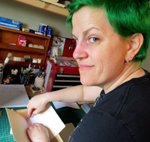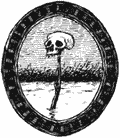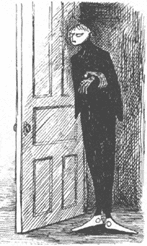Last week I crossed the 1,200 book mark in my library. 1,200 total books, 220 of them unread. (Yes, yes, I know, I’m supposed to be reducing the number of books I own but haven’t read. Powell’s Books and various wonderful friends have been conspiring against me. I do not hold it against either group. I’ve read more books already this year than I did in total last year, so I think I’m doing all right.)
While Twon and I were up in Portland for Memorial Day weekend (photos coming; work has been trying to kill me lately), we wound up part of a discussion about the wonders of ebooks. I find ebooks very clinical and even vaguely horrifying, but couldn’t entirely articulate why in the moment. It’s a bit more clear to me now, sitting at the desk in my library, with my ten packed bookshelves around me.
I’ve written before about the physical artifact, the book, and really I think that’s what it comes down to. Ebooks strip the words out of a book and make them more accessible and searchable and portable and whatnot, but you lose the artifact. There are no pages to whisper under your fingertips, no cover art to charm or unnerve or annoy you, no faint smells to hint at the book’s age or previous owners, no cryptic marginalia, no mild moments of deja vu as you remember turning a particular page at a particular point in an oft-re-read story. And you can’t have an author autograph an ebook, can you? You can’t hand an ebook down the generations, either (like the wonderful 24th edition of Gray’s Anatomy I inherited from my stepfather, which still smells like my grandparents’ house).
And that, to me, steals a lot of the wonder of reading. How can a hunk of plastic and electronics hold the bookness of a book? It can’t. For some folks, that’s fine. The people I was talking with in Portland didn’t seem bothered by the idea. My husband, for example, likes that you can load a whole library onto a single Kindle and search it easily.
But I find it … creepy. Like taking people’s brains out and saving them to disc, then discarding their bodies.
Books tell a story of more than just the words on the page. How crinkled is the spine? Did the owner dogear the pages? Are there tearstains on pages, or notes in the margin? Consider for a moment that a copy of The History of Magic which Aleister Crowley owned and made loads of notes in is currently selling at Powell’s for over $11,000. The books I bought when living in York as an exchange student aren’t just great books, they’re mementos of my time there. My mismatched set of the Otherland series (three paperbacks, with the final book in hardbound) speak to my eagerness to own all the books, which overtook my preference for all the books in any given series to all be in the same format.
It might be neat to have both functionalities, sure — to load ebooks onto my computer for easy searching when I can’t remember which book Mr. So-and-so is in. But then, of course, I’d lose the pleasure of flipping through books, rediscovering bits I’d forgotten as I’m on the road looking for something else. It’s the same thing lost when one consults an online encyclopedia instead of the old-school, physical Encyclopedia Britannica (some day I will own a full set of that encyclopedia, and god, I can’t wait). Remember Philip Jose Farmer’s quote: “Dullard: Someone who looks up a thing in the encyclopedia, turns directly to the entry, reads it, and then closes the book.”
Sure, it’s all much less efficient. But hiking in the woods is less efficient than driving (doubly so when you consider that the vast majority of hikes are loops and you don’t actually get anywhere at the end of all that walking), and that’s still a lovely passtime. I’d worry more about ebooks sounding the death knell of my beloved physical, paper-and-ink books, but I know there are others out there like me, from Nicholas Basbane’s books if nothing else. And from what I saw, Powell’s is doing fine. Thank goodness.




3 Responses to Books and ebooks